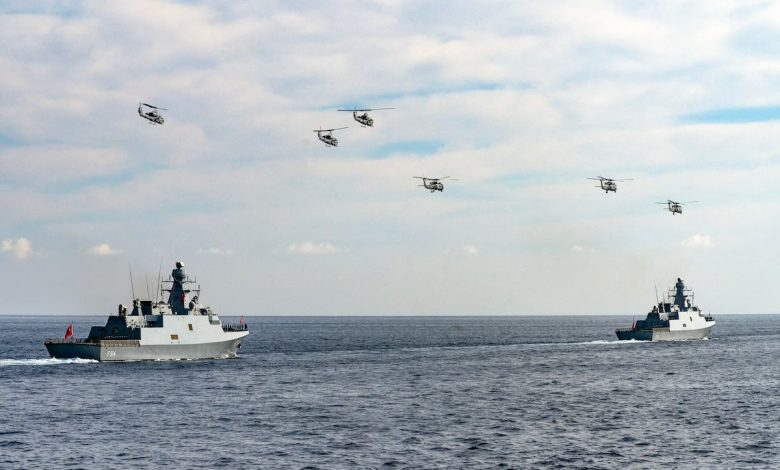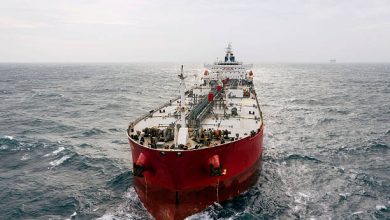Turkish navy touts strategic ambitions with Mavi Vatan 2025 drill

ISTANBUL — The Turkish navy is wrapping up the weeklong Mavi Vatan 2025 exercise this week, a large-scale operation meant to showcase Ankara’s strategic maritime ambitions in the region and beyond.
The Mavi Vatan (Blue Homeland) doctrine, introduced in 2019, symbolizes the country’s shift from a land-focused power to a maritime force, prioritizing the protection of its maritime zones. It reflects a broader transformation of the Turkish navy into a high-seafaring force capable of extended operations.
The doctrine also conveys political messages, particularly regarding maritime disputes in the Eastern Mediterranean, according to Serhat Süha Çubukçuoğlu, senior fellow at the Abu Dhabi, United Arab Emirates-based TRENDS Research & Advisory consultancy.
This year’s exercise aims to evaluate the navy’s command and control capabilities, operational readiness, and ability to operate seamlessly with other branches of the Turkish military, according to military officials. It is part of a broader modernization program that includes the construction of advanced naval platforms, such as the MİLDEN National Submarine, a domestically designed aircraft carrier, and the TF-2000 air defense warship.
All told, the exercise saw the deployment 77 surface ships, 7 submarines, 31 aircraft, 17 helicopters, 28 unmanned aerial vehicles and 7 unmanned surface vehicles. Support from other force commands is meant to further enhance the exercise’s scope and realism. The Land Forces Command contributes 4 general-purpose helicopters and one CH-47 helicopter, while the Air Force Command provides attack aircraft, airborne early warning and control aircraft, and target towing aircraft. The Coast Guard Command is also participating with six vessels. In total, approximately 20,000 personnel are taking part in the exercise.
This week’s event is an addition to the annual naval drill Deniz Kurdu (Sea Wolf), which has been a traditional name for naval exercises since the 1970s, focusing on demonstrating tactical and technical capabilities of the Turkish navy.
Unlike the technical-focused Sea Wolf series, Blue Homeland drills convey political messages because they are about sovereignty and maritime claims, a touchy subject in that part of the Mediterranean.
January has been a busy month for the Turkish navy and private shipyards. According to the Ministry of Defense, the construction of 31 ships is currently ongoing in domestic shipyards, part of a broader plan to make naval shipbuilding a domestic affair.
The naval modernization efforts, with an estimated price tag of $8 billion, aim to safeguard Turkey’s sovereignty and maritime rights, particularly in the Eastern Mediterranean, while honoring agreements with Libya and Turkish Cypriots and addressing territorial disputes in the Aegean, said Mesut Özel, an assistant professor at Kent University in Istanbul.
Besides the geopolitical ambitions inherent in new ships, Turkey’s existing naval fleet is simply getting old.
The frigates in the inventory have been serving in the Turkish navy for an average of 30 years, and the submarines’ average age is 29 years.
“These new vessels will shape our strength for the next 50 years,” said retired Rear Adm. Cem Okyay. “Efforts to ensure that the sensors and weapons on these ships are ready for future operational environments should continue in coordination and merit strong support.”
Turkey’s Mavi Vatan doctrine is seen by Greece and Israel as a major geopolitical challenge, according to Çubukçuoğlu.
“Greece views it as a direct threat to its continental shelf, EEZ claims, and national identity, prompting stronger alliances with Israel, Egypt, Cyprus, the United States, and France,” he said. “For Israel, the doctrine complicates energy projects like the East Med pipeline and poses a strategic challenge in the Eastern Mediterranean, though without Greece’s historical tensions. To counter Turkey’s regional ambitions, Israel collaborates with Greece, Cyprus, and Egypt.”
The geopolitical landscape in the Eastern Mediterranean will remain complex in 2025. With significant changes such as the toppling of the Assad regime, the ousting of Russian forces from Syria, and a brokered ceasefire in Gaza, regional dynamics are shifting rapidly. Moreover, President Biden, in the final days of his administration, authorized the provision of defense articles and services to the Republic of Cyprus, further influencing the balance of power.
Cem Devrim Yaylali is a Turkey correspondent for Defense News. He is a keen photographer of military ships and has a passion for writing about naval and defense issues. He was born in Paris, France, and resides in Istanbul, Turkey. He is married with one son.







